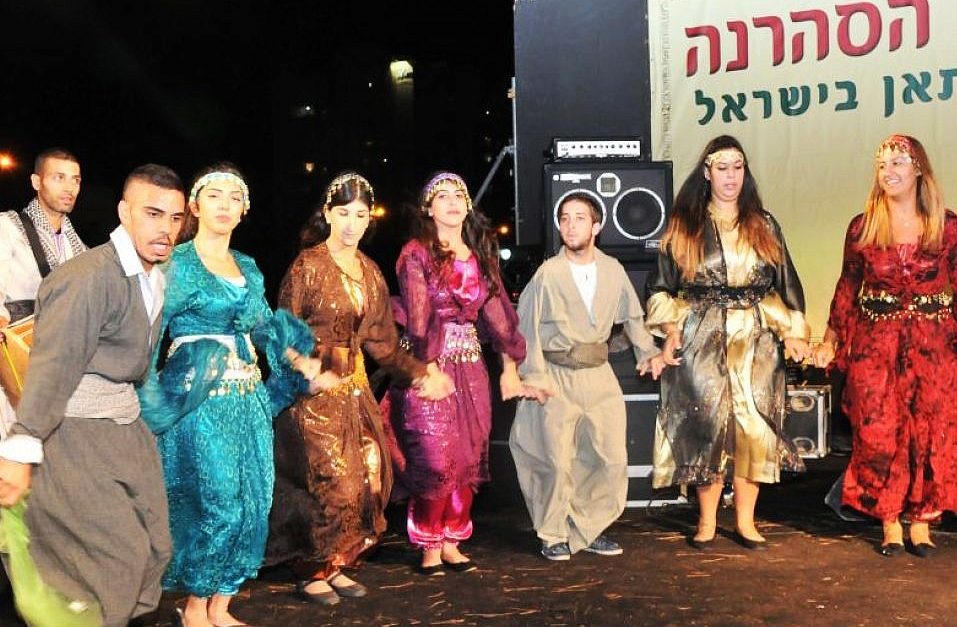
Kurdish Jews in traditional clothing at the 2013 Saharane festival. Via the Times of Israel.
By Pinar Kara
Every Sukkot, the Kurdish Jews of Israel gather to dance, eat delicious foods and share stories about their homeland — the historic Kurdistan, now divided between Turkey, Syria, Iran and Iraq — in the Saharane festival.
The Saharane festival was historically celebrated around springtime and is similar to the Newroz festival, which has Zoroastrian origins and is celebrated by diverse communities in western and central Asia to mark the beginning of spring and the blossoming of nature after winter. Saharane celebrations take place in various cities in Israel, with the biggest gatherings in Jerusalem drawing around 13,000 attendees.
Today, there are around 200,000 Jews living in Israel coming from Arab, Persian, Turkish and Kurdish lands, with the largest migration having taken place between 1948 and 1950. Currently, there are only around 500 Jewish families remaining in what is modern Iraqi Kurdistan. Why did the Jews of Kurdistan leave their homeland and settle in Israel?
The departure of Kurdish Jews from Kurdistan
Kurdistan is a geo-cultural historical region in which the Kurdish people form the majority population. The modern use of the term refers to southeastern Turkey (Northern Kurdistan or Bakurê Kurdistanê in Kurdish), northern Syria (Western Kurdistan or Rojava), northern Iraq (Southern Kurdistan or Başûrê Kurdistanê), and northwestern Iran (Eastern Kurdistan or Rojhilatê Kurdistanê).
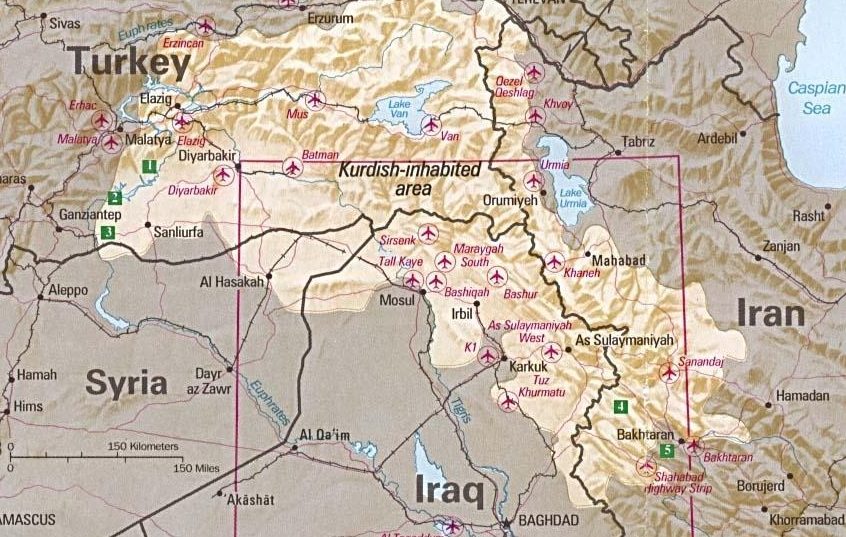
The modern-day region of Kurdistan. Via Wikimedia Commons.
Though nationalist Kurdish organizations have tried to gain independence or a certain level of autonomy, especially throughout the 20th century, Iraqi Kurdistan, known as the autonomous Iraqi Kurdistan region, is the only autonomous Kurdish region today.
On the eve of Israel’s establishment, about 25,000 Jews lived in Kurdistan. The majority of Kurdish Jews were located in Iraq and lived in harmony with their Kurdish Muslim neighbors. They spoke Aramaic, which had been the lingua franca of the Middle East before Arab armies conquered Mesopotamia in the 7th century.
Immigration to the land of Israel/Palestine began as early as the 16th century, but it was not until the early 1950s that the majority of Kurdish Jews left historic Kurdistan. That was when the Iraqi government passed laws canceling citizenship and freezing the property and assets of many Iraqi Jews.
The passage of these laws coincided with a series of bomb attacks on Jewish synagogues, cafes and other targets of Jewish life in Baghdad. The influence of Nazi doctrine became increasingly apparent in public speeches in Iraq and gained popularity among the general population.
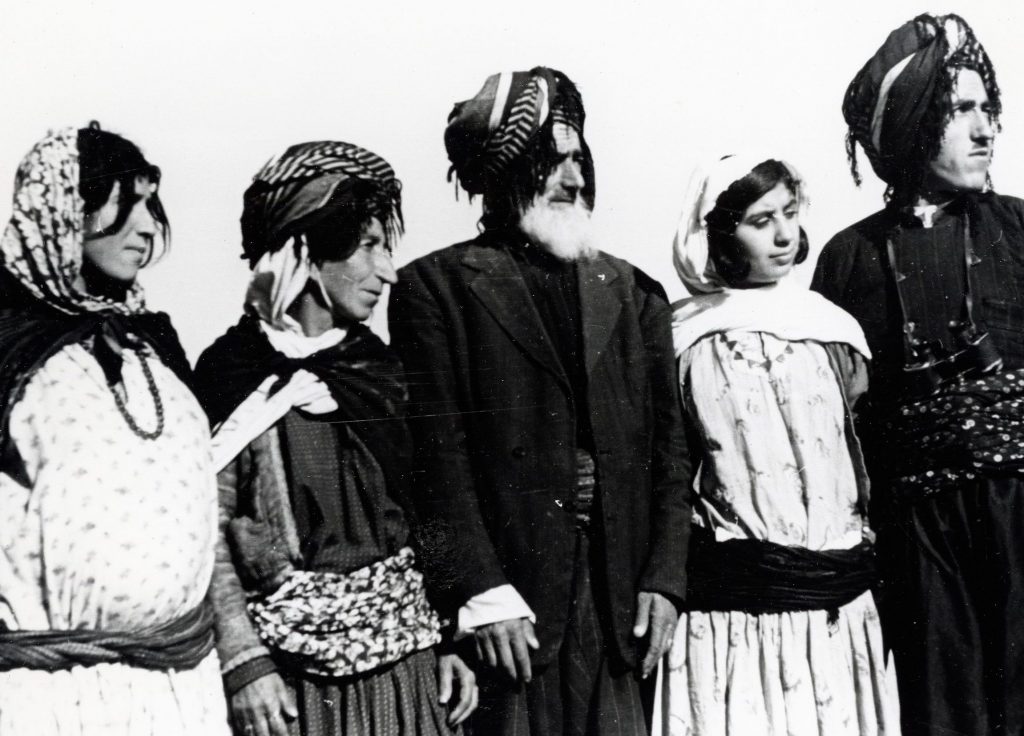
Refugee Kurdish Jews in Tehran, Iran, in 1950. Via the Magnes Collection of Jewish Art and Life, UC Berkeley.
In 1948, Iraq was among several Middle Eastern countries that declared war against the newly established state of Israel. This was a major turning point for the Jews of Iraq and for Jews all over the Middle East. As conditions deteriorated for Jews in Iraq and other Middle Eastern countries, Israel passed the Law of Return, which allowed Jews all over the world to immigrate to Israel.
With the (financial) help of the American Jewish Joint Distribution Committee, also known as the JDC, over 120,000 Iraqi and Kurdish Jews were airlifted to Israel. This massive emigration in the early 1950s came to be known as Operation Ezra and Nehemiah and paved the way for later airlifts of Jews in the Middle East and all over the world.
Kurdish-Jewish life in Israel today
Today, the largest concentration of Kurdish Jews is in Jerusalem. While many of the Kurdish immigrants who came to Israel had an agricultural background and integration into urban life in Israel was hard at first, the majority of Kurdish Jews today define themselves as Israeli and have adopted Hebrew as their primary language. Intermarriage between Jews of various ethnic background is also increasing in Israel.
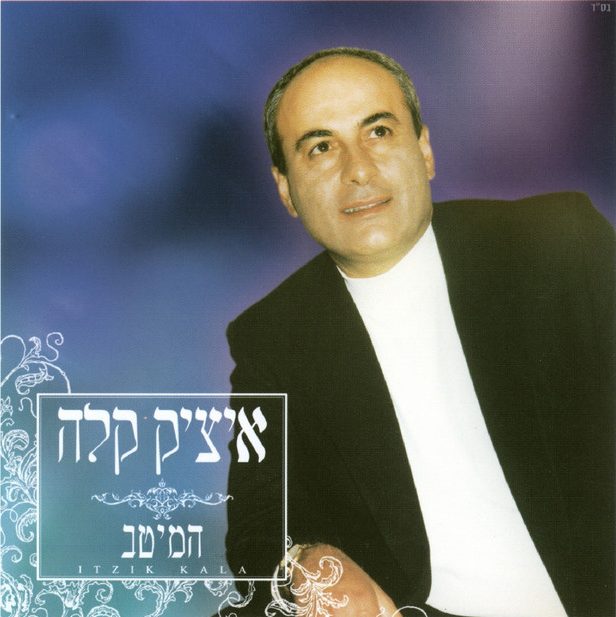
Album cover of Itzik Kala’s music.
The Saharane festival has remained an integral part of Kurdish-Jewish life in Israel today and is celebrated by people of all ages. Just as they did in their historic homeland, Kurdish communities gather and spend their days together singing, dancing and sharing traditional Kurdish dishes.
In addition to keeping Kurdish traditions alive, the festival is used as an opportunity for the community to highlight and celebrate Jewish Kurds who have attained important positions in Israeli society. Examples include Itzik Kala, an Israeli singer of Kurdish descent who sings in Aramaic, Kurdish and Hebrew and who has released 30 studio albums to date, and Moshe Barazani, an Iraqi-born Kurdish Jew and member of the Olei Hagardom, the Jewish underground fighters executed by the British in Mandatory Palestine, who are memorialized and widely commemorated as national heroes in Israel today.
The past few years have seen an emergence of organizations that foster Kurdish-Israeli relations, such as the Kurdish-Israeli Friendship Association or Jewish Coalitions for Kurdistan. The founder of Jewish Coalitions for Kurdistan stated: “There is a kinship between the two peoples, the Jewish one and the Kurdish one, that transcends merely political calculus. We are two nations of several million people who by and large both stand for Western values such as tolerance, progress, equal rights for women and who, in the Middle East and beyond, stand up to tyranny and fanaticism.”
Fostering Kurdish-Israeli connections
Many of the almost 200,000 Kurdish Jews in Israel and their descendants have integrated fully into Israeli society. Yet, they continue to have a strong cultural connection to their homeland and remain highly political. This became especially apparent when Iraqi Kurds voted for independence in a nonbinding referendum and Kurdish Jews in Israel gathered in Jerusalem’s Independence Park in support of independence. Increasingly, Muslim Kurds are also visiting their old neighbors in Israel for special gatherings like the Saharane festival.
The ties between Kurds in Israel and the Kurdish heartland have deepened, and Kurds in both areas promote cultural initiatives. Although there are some political initiatives that push politicians in Israel and the Kurdish Regional Government to expand on their official support of each other, the motivations behind these initiatives are often cultural and nostalgic. Many of the Kurdish Jews in Israel just hope to explore their family roots, visit their childhood friends and celebrate the Saharane festival with their Muslim Kurdish, Muslim Iraqi and Israeli Jewish friends in hopes of a multicultural and peaceful Middle East.
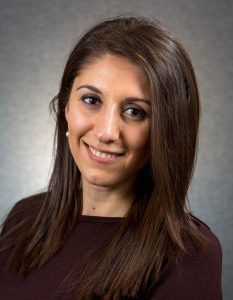 Pinar Kara is a Ph.D. candidate at the Henry M. Jackson School of International Studies focusing on immigrant and civil society studies in Germany. She is currently conducting dissertation research in Berlin as a fellow of the Free University’s Berlin Program for Advanced German and European Studies.
Pinar Kara is a Ph.D. candidate at the Henry M. Jackson School of International Studies focusing on immigrant and civil society studies in Germany. She is currently conducting dissertation research in Berlin as a fellow of the Free University’s Berlin Program for Advanced German and European Studies.

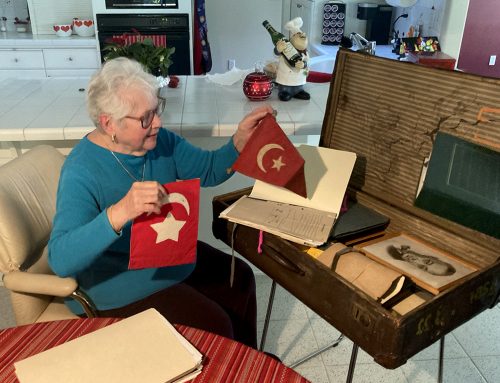





I think that maybe this is a mistake and should be “7th century”? See “The majority of Kurdish Jews were located in Iraq and lived in harmony with their Kurdish Muslim neighbors. They spoke Aramaic, which had been the lingua franca of the Middle East before Arab armies conquered Mesopotamia in the 17th century.”
Yes, you are correct. Thank you for catching this mistake, which has been updated in the article.
It’s a completely accurate observation. It is a liturgical language. It is not an ethnolanguage. For instance, Aramaic was one of the official languages of the Sasanian empire. Armenian Christians used this language too. Syriac as well as Greek was the source language for 11th century kurdish philosophers like Shahrazuri and Suhrawardi.
This article perpetuates a tragic error.
There is no such thing as a Kurdish Jew.
The cruelty, injustice, and abuse – murder, rape, abduction of wives and daughters, plunder, and extortion – by the Kurds, particularly the Aghas, of the Jewish residents of Assyria (there is no recognized Kurdistan, and the Kurds have no claim to Assyria, as they are invaders from Persia) is well-documented and attested by surviving Jews, or their parents and grandparents, from Zakho, Amedia, Barashi, Barazani, and all other villages and cities where they lived.
Jews spoke their own Jewish dialects of Aramit, such as Lishanan, Lishana Deni, and others, and they only resorted to Kurdish when it was necessary to speak to their Kurdish neighbors.
For the sake of historical justice, we must stop calling these Jews “Kurdish” but their authentic designation “Assyrian”, and, no, the Kurds were never friends of the Jews – or the Christians, for that matter. To this day, the Kurds persecute the Christian Assyrians in the area.
We must insist on Assyrian self-determination, and we must insist on the Kurds respecting Assyrian self-determination and immediately ceasing their theft of Assyrian property and infringement of Assyrian rights.
First of all, the person who says that Kurds came from Persians is experiencing a hallucination. Secondly, the definition of Assyria is merely a political definition and does not have any linguistic or historical content. There is not a single of objective data about the history of the Christian community who defines himself as Assyrian. The only truth about these people is: these people serve as servants or slaves for whoever comes to power. Hence, they defend the arguments of Arab nationalists. They humiliate other people by using a certain jargon without considering their own situation.
THERE ARE JEWISH KURDS AND THEY WILL CONTINUE TO EXIST. Greetings from Kurdistan to my Jewish Kurdish brothers.
Oh thank God someone said the truth👏
Kurds are the descendants of the Med empire, not the Persians. Even though most Kurds are Muslims, Muslim countries have been oppressing Kurds and banning their language for years. Just like Lenin said, every nation has the right to determine its own destiny. Greetings to my Kurdish Jewish brothers. Long live the Kurdish brotherhood, regardless of religion